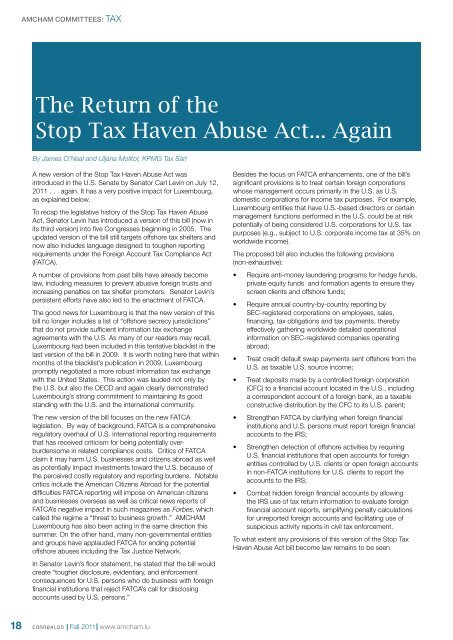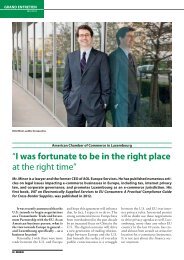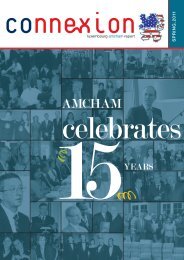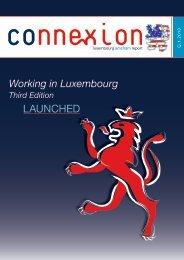Beyond the Business - The American Chamber of Commerce ...
Beyond the Business - The American Chamber of Commerce ...
Beyond the Business - The American Chamber of Commerce ...
Create successful ePaper yourself
Turn your PDF publications into a flip-book with our unique Google optimized e-Paper software.
AMCHAM CoMMITTEES: TAx<br />
<strong>the</strong> return <strong>of</strong> <strong>the</strong><br />
stop tax haven abuse act... again<br />
By James O’Neal and Uljana Molitor, KPMG Tax Sàrl<br />
A new version <strong>of</strong> <strong>the</strong> Stop Tax haven Abuse Act was<br />
introduced in <strong>the</strong> u.S. Senate by Senator Carl Levin on july 12,<br />
2011 . . . again. It has a very positive impact for Luxembourg,<br />
as explained below.<br />
To recap <strong>the</strong> legislative history <strong>of</strong> <strong>the</strong> Stop Tax haven Abuse<br />
Act, Senator Levin has introduced a version <strong>of</strong> this bill (now in<br />
its third version) into five Congresses beginning in 2005. <strong>The</strong><br />
updated version <strong>of</strong> <strong>the</strong> bill still targets <strong>of</strong>fshore tax shelters and<br />
now also includes language designed to toughen reporting<br />
requirements under <strong>the</strong> Foreign Account Tax Compliance Act<br />
(FATCA).<br />
A number <strong>of</strong> provisions from past bills have already become<br />
law, including measures to prevent abusive foreign trusts and<br />
increasing penalties on tax shelter promoters. Senator Levin’s<br />
persistent efforts have also led to <strong>the</strong> enactment <strong>of</strong> FATCA.<br />
<strong>The</strong> good news for Luxembourg is that <strong>the</strong> new version <strong>of</strong> this<br />
bill no longer includes a list <strong>of</strong> “<strong>of</strong>fshore secrecy jurisdictions”<br />
that do not provide sufficient information tax exchange<br />
agreements with <strong>the</strong> u.S. As many <strong>of</strong> our readers may recall,<br />
Luxembourg had been included in this tentative blacklist in <strong>the</strong><br />
last version <strong>of</strong> <strong>the</strong> bill in 2009. It is worth noting here that within<br />
months <strong>of</strong> <strong>the</strong> blacklist’s publication in 2009, Luxembourg<br />
promptly negotiated a more robust information tax exchange<br />
with <strong>the</strong> united States. This action was lauded not only by<br />
<strong>the</strong> u.S. but also <strong>the</strong> OeCD and again clearly demonstrated<br />
Luxembourg’s strong commitment to maintaining its good<br />
standing with <strong>the</strong> u.S. and <strong>the</strong> international community.<br />
<strong>The</strong> new version <strong>of</strong> <strong>the</strong> bill focuses on <strong>the</strong> new FATCA<br />
legislation. by way <strong>of</strong> background, FATCA is a comprehensive<br />
regulatory overhaul <strong>of</strong> u.S. international reporting requirements<br />
that has received criticism for being potentially overburdensome<br />
in related compliance costs. Critics <strong>of</strong> FATCA<br />
claim it may harm u.S. businesses and citizens abroad as well<br />
as potentially impact investments toward <strong>the</strong> u.S. because <strong>of</strong><br />
<strong>the</strong> perceived costly regulatory and reporting burdens. Notable<br />
critics include <strong>the</strong> <strong>American</strong> Citizens Abroad for <strong>the</strong> potential<br />
difficulties FATCA reporting will impose on <strong>American</strong> citizens<br />
and businesses overseas as well as critical news reports <strong>of</strong><br />
FATCA’s negative impact in such magazines as Forbes, which<br />
called <strong>the</strong> regime a “threat to business growth.” AMChAM<br />
Luxembourg has also been acting in <strong>the</strong> same direction this<br />
summer. On <strong>the</strong> o<strong>the</strong>r hand, many non-governmental entities<br />
and groups have applauded FATCA for ending potential<br />
<strong>of</strong>fshore abuses including <strong>the</strong> Tax justice Network.<br />
In Senator Levin’s floor statement, he stated that <strong>the</strong> bill would<br />
create “tougher disclosure, evidentiary, and enforcement<br />
consequences for u.S. persons who do business with foreign<br />
financial institutions that reject FATCA’s call for disclosing<br />
accounts used by u.S. persons.”<br />
18 Connexion Fall 2011 www.amcham.lu<br />
besides <strong>the</strong> focus on FATCA enhancements, one <strong>of</strong> <strong>the</strong> bill’s<br />
significant provisions is to treat certain foreign corporations<br />
whose management occurs primarily in <strong>the</strong> u.S. as u.S.<br />
domestic corporations for income tax purposes. For example,<br />
Luxembourg entities that have u.S.-based directors or certain<br />
management functions performed in <strong>the</strong> u.S. could be at risk<br />
potentially <strong>of</strong> being considered u.S. corporations for u.S. tax<br />
purposes (e.g., subject to u.S. corporate income tax at 35% on<br />
worldwide income).<br />
<strong>The</strong> proposed bill also includes <strong>the</strong> following provisions<br />
(non-exhaustive):<br />
•<br />
•<br />
•<br />
•<br />
•<br />
•<br />
•<br />
require anti-money laundering programs for hedge funds,<br />
private equity funds and formation agents to ensure <strong>the</strong>y<br />
screen clients and <strong>of</strong>fshore funds;<br />
require annual country-by-country reporting by<br />
SeC-registered corporations on employees, sales,<br />
financing, tax obligations and tax payments, <strong>the</strong>reby<br />
effectively ga<strong>the</strong>ring worldwide detailed operational<br />
information on SeC-registered companies operating<br />
abroad;<br />
Treat credit default swap payments sent <strong>of</strong>fshore from <strong>the</strong><br />
u.S. as taxable u.S. source income;<br />
Treat deposits made by a controlled foreign corporation<br />
(CFC) to a financial account located in <strong>the</strong> u.S., including<br />
a correspondent account <strong>of</strong> a foreign bank, as a taxable<br />
constructive distribution by <strong>the</strong> CFC to its u.S. parent;<br />
Streng<strong>the</strong>n FATCA by clarifying when foreign financial<br />
institutions and u.S. persons must report foreign financial<br />
accounts to <strong>the</strong> IrS;<br />
Streng<strong>the</strong>n detection <strong>of</strong> <strong>of</strong>fshore activities by requiring<br />
u.S. financial institutions that open accounts for foreign<br />
entities controlled by u.S. clients or open foreign accounts<br />
in non-FATCA institutions for u.S. clients to report <strong>the</strong><br />
accounts to <strong>the</strong> IrS;<br />
Combat hidden foreign financial accounts by allowing<br />
<strong>the</strong> IrS use <strong>of</strong> tax return information to evaluate foreign<br />
financial account reports, simplifying penalty calculations<br />
for unreported foreign accounts and facilitating use <strong>of</strong><br />
suspicious activity reports in civil tax enforcement.<br />
To what extent any provisions <strong>of</strong> this version <strong>of</strong> <strong>the</strong> Stop Tax<br />
haven Abuse Act bill become law remains to be seen.















